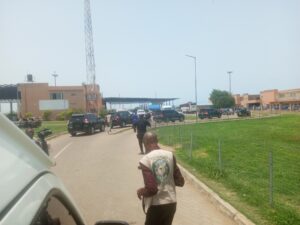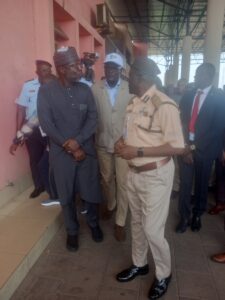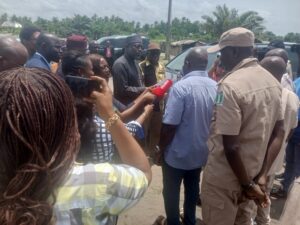ECOWAS President, Dr. Omar Alieu Touray’s Road to Unity and Regional Integration: A Journalist’s Perspective By Raymond Enoch
In

 an era where regional diplomacy often feels distant from the daily struggles of ordinary citizens, Dr. Omar Alieu Touray, President of the ECOWAS Commission, is charting a remarkably different course of leadership—one painted with empathy, with action, and visibility.
an era where regional diplomacy often feels distant from the daily struggles of ordinary citizens, Dr. Omar Alieu Touray, President of the ECOWAS Commission, is charting a remarkably different course of leadership—one painted with empathy, with action, and visibility.
His recent visit to the Nigeria -Seme Joint Border Station—a critical artery of trade and human mobility between Nigeria and the Republic of Benin up into Abidjan—was far from a ceremonial diplomatic tour. It was a bold step of, on-the-ground mission that laid bare both the promise and pain points of West Africa’s economic integration efforts.
Rather than arrive with a heavy security convoy or aerial entourage, Dr. Touray journeyed by road through the congested, potholed, and heavily policed Lagos–Seme border corridor. It was a deliberate decision that exposed him to the daily realities of traders, transporters, and border communities: from extortion and delays to crumbling infrastructure and bureaucratic gridlock that greeted any one who uses that road.
What unfolded was more than a symbolic gesture—it was leadership redefined. A leadership that West Africa Region needs at the moment, a leadership that feels the pains of its citizens.
At every stop on the trip, Dr. Touray engaged directly with drivers, questioned and listened to security officials, and listened also to the grievances of ordinary citizens. His presence sent a strong message: regional integration cannot succeed from the comfort of air-conditioned boardrooms—it must be lived, felt, and acted upon at the grassroots.
“I saw a leader not just managing from the comforts of an office in Abuja,” one observer noted, “but one willing to walk the same road as the people his policies affect.”
At the border post itself, Dr. Touray inspected ECOWAS-backed infrastructure, acknowledged the shortfalls, and pledged to push for sustainable improvements. But beyond promises, his tone was strikingly personal: “It’s about the people,” he said. “Integration is not a dream confined to documents—it must function at the borders where lives are shaped daily.”
His visit comes at a critical time. With the Alliance of Sahel States (AES) threatening to exit ECOWAS amid escalating political tensions, Dr. Touray’s hands-on engagement served as both reassurance and resolve. His leadership is a clear counter to the rising narrative of disengagement—proving instead that ECOWAS is not retreating, but re-engaging.
As a journalist who has long followed regional politics, watching Dr. Touray in action during the visit was revelatory. His leadership style—is indeed marked by humility, responsiveness, and a commitment for real-world solutions—signals a refreshing shift in West African diplomacy, Institutional management and responsibility.
This story, however, is not just about one man in the ECOWAS Commission. It is about what his leadership symbolizes in the course of history: a new chapter for ECOWAS marked by defined credibility, connection to the citizens of West Africa, and courage. It is about rekindling trust in regional institutions working, and redefining what it means to lead in a region at the crossroads of political fragmentation, economic and security fragility.
In Dr. Touray, West Africa has not just a diplomat, but a transformative bridge-builder. A leader who walks the road lane—quite literally—with his people. And in that, lies the hope for a more united, integrated, and prosperous region of our times.








